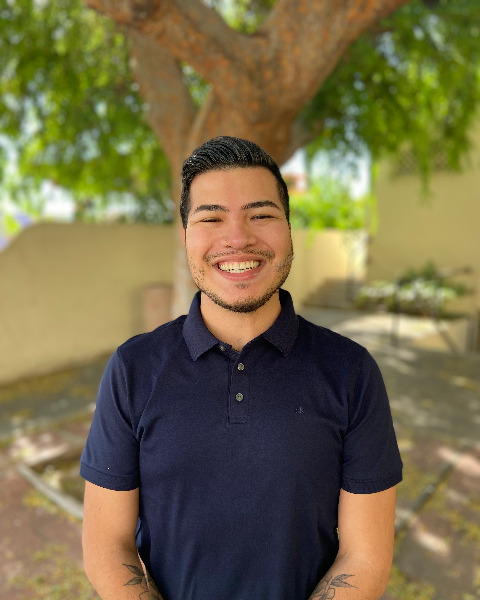Poster Presentation
Social Justice and Health Equity
Thursday Poster Power Hour
THURS-003 - Enhancing Spiritual Well-being and Reducing Stress with Culturally Adapted Digital Health Coaching for Diverse Communities
Thursday, April 17, 2025
11:45 AM - 12:45 PM PST
Location: Pacific I/II, 2nd Floor
Area of Responsibility: Area VI: Communication
Subcompetencies: 6.3 Develop message(s) using communication theories and/or models., 6.4 Select methods and technologies used to deliver message(s).
Research or Practice: Practice
Subcompetencies: 6.3 Develop message(s) using communication theories and/or models., 6.4 Select methods and technologies used to deliver message(s).
Research or Practice: Practice

Adam J. Landeros, MPH MS (he/they)
Research Project Manager
Division of Medicine-Pediatrics and Preventive Medicine, UCLA Health
Los Angeles, California, United States
Poster Presenter(s)
Learning Objectives:
At the end of this session, participants will be able to:
- Identify 5 communication principles that will increase audience engagement and behavioral impact of spiritual health promotion messaging.
- Select 3 mental and/or spiritual health outcomes that may be addressed using a digital health coaching program.
Detailed abstract description: Both spirituality and religiosity are powerful determinants of health that are associated with better physical health outcomes and overall lower mortality. Systematic reviews show that health interventions including spiritual and religious components reduce stress, depression, and alcoholism and may improve quality of life, physical activity, weight control, and other behaviors.
Spiritual health is widely recognized as a core dimension of health and wellness. Among Latinos and other communities of color, where daily prayer and reflection are quite common, promoting better health and wellness via increased spirituality may positively impact health behaviors.
Our team of student researchers, community health workers, and behavioral health experts developed a holistic digital health promotion program based on well-established health behavior change theories informed by Ignatian spiritual values.
The 4-6 week pilot program provided weekly health and wellness coaching via Zoom and daily automated and standardized mobile phone messaging on physical, mental, and spiritual health. The approach emphasized context and lived experience, action and goal-setting, and reflection and progress evaluation. Messages included spiritual health practices through references to prayer along with meditation, mindfulness, yoga, and nature walks to resonate with all people regardless of specific religious beliefs or practices. One message included, for example: “What did you do for your spirituality today? Set aside time every day to do something that helps you spiritually, like meditation, yoga, prayer, nature walks, or community service.” Messages featured culturally specific images and were bilingual, warm, friendly, affirming, and encouraging.
The program was evaluated in two separate pilot studies with Latina university students and healthcare workers serving low-income communities in Northern California. Data was gathered from 51 participants through a pre-post online survey and in-depth interviews on program completion. We analyzed program effectiveness using thematic analysis in NVivo, as well as paired-sample t-tests and Wilcoxon matched pairs signed-rank tests.
Quantitative results showed statistically significant increases in daily wellness practices, physical activity, and feelings of happiness, as well as decreased stress and sleep difficulties. Participants reported a stronger sense of purpose and life satisfaction, more meaningful connections, and a stronger relationship with a higher power after participating in the program.
The qualitative data revealed that cultural tailoring and attention to spiritual and holistic health resonated with participants, making them feel calm, happy, empowered, and motivated for health improvement – findings that align with research showing that spiritual practices prompt positive emotions that help to alleviate stress.
